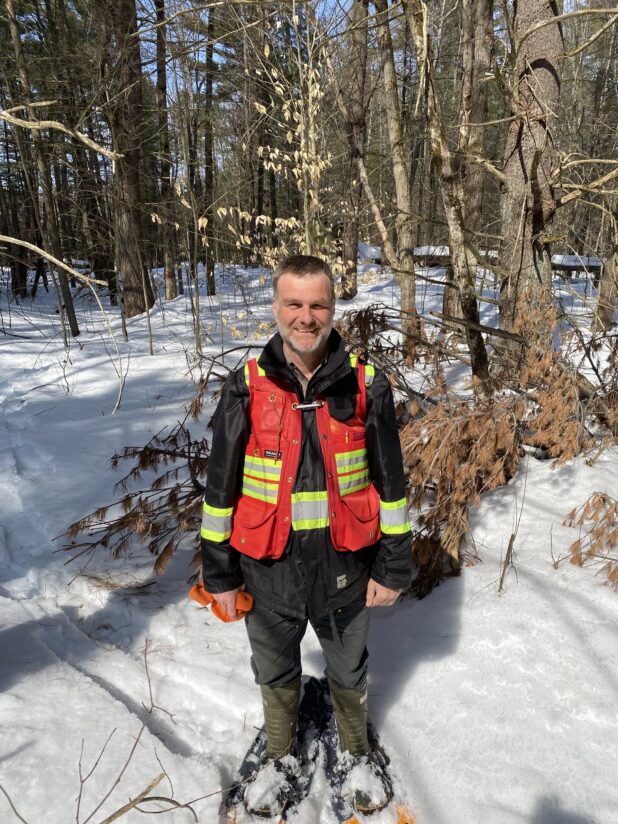General News
Local forester honoured by Ontario Woodlot Association
May 30, 2023

By Nate Smelle
Since it was founded in 1992, the Ontario Woodlot Association has been supporting woodlot owners and promoting sustainable woodlot management practices throughout the province. Each year the association hosts an annual conference where it presents awards to those who have made an important impact on sustainable forest management, stewardship and outreach.
One of the most prestigious awards handed out at the ceremony is the Ken Armson Professional Award. Named in honour of the professional forester and officer of the Order of Canada who spent more than 50 years in forestry education, research, policy, and administration, the award is presented to an individual, group, or business that exemplifies outstanding professional contributions to the vision, mission, and values of the Ontario Woodlot Association.
At this year’s ceremony the Ontario Woodlot Association named Ernie Demuth as the recipient of the Ken Armson Professional Award for 2023.
“It is such an honour to be recognized by the Ontario Woodlot Association for this award,” Demuth told Bancroft This Week. “Ken Armson is a very respected forester with many achievements throughout his career in Ontario. I have one of his books in my library!”
Celebrated for his long established career as a well-respected Registered Professional Forester in the Bancroft and Haliburton area, Demuth currently works as a forester for the Ministry of Natural Resources and Forestry at the Peterborough Bancroft District. During his career, he created and managed his own forestry consulting business offering services on Crown and private land; worked for the local Sustainable Forest Licence holder on Crown land, Bancroft Minden Forest Company Inc.; served as president of the Bancroft Areas Forest Industry Association; volunteered his time to mentor aspiring foresters and tree markers; and, co-founded Forestry Day – a free one day program for middle school children on forest management.
Offering advice to anyone who might want to follow in his footsteps, Demuth said, “Like with most careers, networking and establishing a good support network of forestry professionals is important. A real entrepreneurial attitude can be a huge help.”
For a good portion of his career, Demuth said he worked as a tree marker, often working full days on his own in a secluded section of a forest somewhere in Ontario. Having spent so much time in nature, he has learned to focus on how forests change over time and throughout the seasons; and of course through various forms of management. With this in mind as he navigates the challenges of today’s forestry industry, Demuth said he has learned how important it is to be able to adapt.
“No forest is static, meaning it is always in a state of change,” said Demuth. “How we practice forestry is also in a state of change as we learn more about forests and factors that can put them under threat, sometimes unknowingly. Today, invasive species have become a major component in how foresters manage. There are tools that foresters have or are developing in addressing invasives as well as an ever-changing climate.”
From a forester’s lens, Demuth said what they study is known as silviculture. In this field, he said they primarily focus on the control, establishment and management of forest stands. While Demuth describes silviculture as the foundation of their practice, he said it is only a part of sustainable forest management. When it comes to sustainable forestry, Demuth sees great value in the stewardship practiced by Indigenous peoples since time immemorial.
“Learning from Indigenous communities to understand their values which include the protection of water, wildlife, plant communities as well as recreational values, to name a few are all taken into consideration when planning a sustainable harvest,” explained Demuth. “Locally, especially in the Haliburton area, we have a great deal of hardwood deciduous forests which make up part of the Great Lake-St. Lawrence forest region. These are known as tolerant hardwood forests, and can be quite complex in how they grow and as a result how they are managed. Often these types of forests are naturally regenerating and do not require planting. It is not as simple as cutting down trees and replanting them but more a responsibility of extracting resources while maintaining a healthy ecosystem that will continue to grow into the next generations.”


















